S4C: Birthplace of SuperTed and Fireman Sam turns 40
Alex Jones, Fireman Sam, Rhys Ifans, Duffy, Ioan Gruffudd, Gethin Jones, SuperTed - all of these well-known faces have one thing in common.
As well as being Welsh, they all came off the production line of a TV station not widely known around the world.
Welsh language channel Sianel Pedwar Cymru (S4C), meaning Channel Four Wales, was first broadcast on 1 November 1982.
Now the channel is turning 40 amid warnings it is facing major challenges.
The famous faces of S4C's alumni
 BBC/Ray Burmiston
BBC/Ray BurmistonOne Show presenter Alex Jones from Ammanford, Carmarthenshire, was a presenter on S4C's singing programme Cân i Gymru (A Song for Wales) and a number of children's shows.
Fireman Sam first appeared on S4C on 1 November 1987 as Sam Tan - now famous around the world
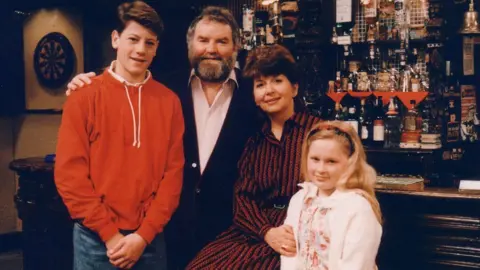 S4C
S4CSuperTed was first broadcast on S4C on 1 November 1982, the day it launched, before it was sold to 128 different countries around the world and dubbed in 32 different languages.
Spider-Man, Notting Hill, and more recently, House of the Dragon star Rhys Ifans, from Ruthin, Denbighshire, has presented several television programmes and starred in dramas on S4C.
In 2000, the year after he starred in Notting Hill, he narrated the S4C's children's animated series Sali Mali.

Titanic and Hornblower star Ioan Gruffudd, from Cardiff, was in Pobol Y Cwm, the longest-running soap opera produced by the BBC, from 1987 to 1994.
Cardiff-born TV star Gethin Jones, who presented Blue Peter and currently fronts Morning Live on BBC One, was a children's presenter on S4C.
 Press Association
Press AssociationMusician Duffy, who was born in Bangor, Gwynedd, made her TV debut on S4C's talent show Wawffactor, finishing second in 2004.
How did S4C come about?
There was already a radio station in the Welsh language run by the BBC, BBC Radio Cymru, which had been launched in 1977 - but campaigners wanted their own television service.
Both the Conservative and Labour parties promised a Welsh-language fourth channel in their manifesto for the 1979 general election.
However, shortly after Margaret Thatcher's Tories won a majority, the then-Home Secretary William Whitelaw decided against the plan, instead suggesting an occasional opt-out in Welsh.
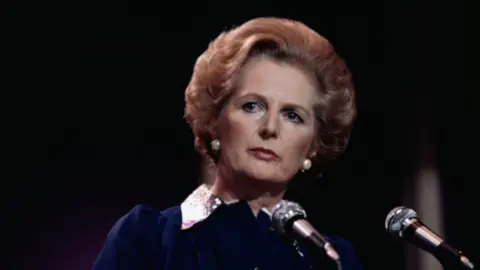 Getty Images
Getty ImagesBut Thatcher, who famously said she was a lady who was ""not for turning", did a U-turn and S4C was granted Parliamentary approval after activists attacked television transmitters in Welsh-speaking heartlands of Wales and former Plaid Cymru president Gwynfor Evans threatened a hunger strike.
On 1 November 1982, at 18:00, S4C launched, initially with 22 hours a week of programmes, most being broadcast during prime time.
Presenter Sian Thomas was one of a team of three presenters at the launch.
"It was very exciting," she recalled.
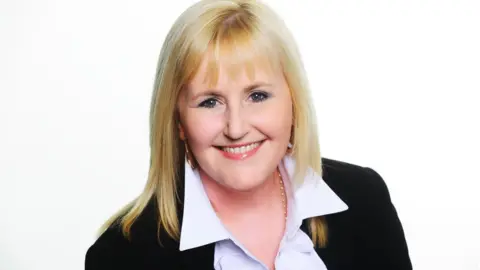 S4C
S4C"I think anybody who spoke Welsh in 1982 was aware of the fight for S4C and the campaigning and protest - but then it arrived.
"The pressure on those of us who were fronting this was huge but we were aware of the fact that we were doing something historic, but oh my gosh were we nervous."
Apart from prime time slots and the teatime slot for children, initially S4C took English language programmes from Channel 4, rescheduled to fit around the Welsh programmes.
"We as presenters were switching languages and genres throughout the day," said Sian.
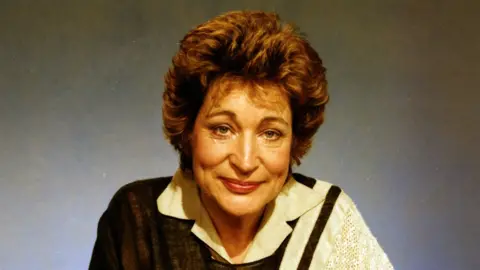
After the completion of the digital switchover in Wales on 31 March 2010, Channel 4 became available on Freeview and S4C ceased airing English-language programmes.
Sian said she was amazed at how technology had changed since S4C's launch.
"When we went on air in 1982 you still had to get up out of your chair to change channels, now you see 100s of channels and can watch me in the palm of your hand," she said.
"If you would have told me that 40 years ago I wouldn't have believed it. The industry has changed beyond recognition."
Dr Elain Price, a lecturer in media studies at Swansea University said S4C was "highly innovative" in its early years.
"It enabled the independent sector to grow from nothing in Wales," she said.
"A flourish of independent companies grew across Wales producing fantastic programmes for the channel.
"There were new opportunities not just in front of the camera but behind the camera as well".
What's the future for S4C?
During 2021-22, 1.6 million people watched S4C's content on television in Wales at some point, and 300,000 in Wales viewed its content each week - a decrease of 4% over the past year in terms of weekly reach and 7% in yearly reach.
It could be argued the Welsh government's target for a million Welsh speakers by 2050 can only be good news for the channel - for the year ending 31 December 2021, figures suggested about 892,200 people or 29.5% of the population were able to speak Welsh.
In January S4C welcomed a new funding settlement, which saw an increase in the funding it gets from the BBC licence fee from £74.5m to £88.8m.
The figure includes £6.8m that was previously provided directly by the UK government, but now instead comes from the licence fee as well.
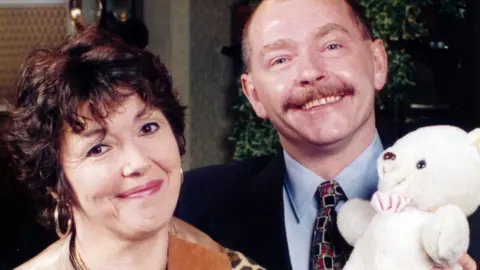
But S4C Chairman Rhodri Williams warned the situation had since changed and said soaring inflation was hitting the channel's budget.
"Like all other businesses in Wales and across UK, the threat of inflation at the rate we have it now will have an effect on what our money can buy for us," he said.
"We have the same amount of money but we won't be able to buy as much for it and that is inevitably going to have a detrimental effect on the amount of content we can commission from our suppliers."
Despite the challenges he is optimistic for S4C's future.
"We have the talent and I am confident we can carry on well in to the future," he said.
S4C's Chief Executive Sian Doyle said: "As S4C celebrates this notable milestone, it is an opportunity for us to look ahead to how S4C can develop into the future".
Ms Doyle added: "Our dramas attract audiences from all over the world and increasing subtitling has helped broaden horizons and created an opportunity for us to realise some of the channel's main objectives, to be a home for everyone, to raise awareness of Welsh culture and most importantly, to support the prosperity of our language".
Welsh Secretary David TC Davies congratulated the channel on its anniversary, adding it had "educated and entertained generations of audiences and plays a crucial role in the creative industries in Wales".

- BAFTA CYMRU WINNERS: Celebrate the best television from Wales
- CELEBRATING WELSH POP: A decade-by-decade romp through the TV archives

